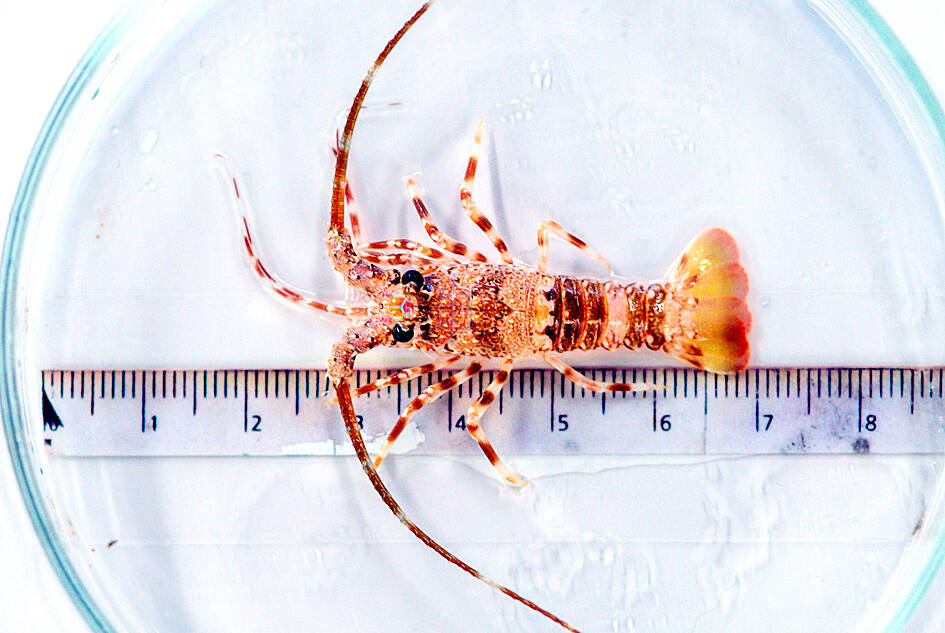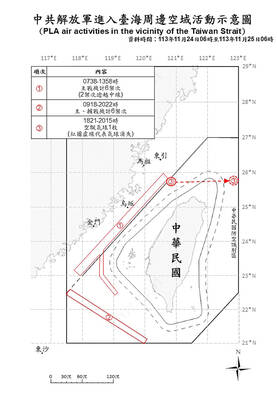Taiwanese aquaculture researchers have raised the survival rate of lobster hatchlings from 40 percent to 70 percent, the Council of Agriculture’s Taitung District Agricultural Research and Extension Station said.
The station unveiled the breakthrough at a trade convention in November last year.
Lobster spawns molt several times in the six months following hatching to reach the postlarvae stage, said Cheng Ming-chung (鄭明忠), an assistant researcher with the Fisheries Research Institute’s Eastern Marine Biology Research Center.

Photo courtesy of Cheng Ming-chung
Postlarvae are highly sensitive to water quality and fluctuations in environmental factors, and regularly engage in cannibalism, which makes keeping them alive a technical challenge for lobster farms, said Cheng, who led the project to improve lobster farming techniques.
Taiwanese lobster farms typically import 2cm-long postlarvae harvested from the sea and raise them into 4cm-long juveniles, he said.
The research team solved the issue of cannibalism by introducing shrimp larvae into the pool for the postlarvae to hunt, while large clumps of kelp provided hiding places, he said, adding that new technologies were used to improve the regulation of water and feed quality.
The techniques could help farmers raise more lobsters from the same larvae stock, and improve the flavor of the tomalley and the firmness of the meat, Cheng said.
The researchers used the species Panulirus homarus and Panulirus ornatus in the study, with the former being the more readily available and economic option for Taiwanese lobster farms, he said.
Using the new methods, the Panulirus homarus could grow from 2cm-long prolarvae to 4cm-5cm juveniles in two months, Cheng said, adding that the juveniles could then be transferred to downstream farms specializing in growing adults.
Juveniles can grow into market-ready adults weighing 250g to 300g in eight months, he added.
The Council of Agriculture has unveiled a policy to encourage the use of solar panels on lobster farms with indoor pools, to ensure a stable power supply and water salinity levels at the farms, center director Ho Yuan-hsing (何源興) said.
Open-air lobster farms are prone to drops in water salinity due to power outages or human error, which could lead to larvae deaths, he said, adding that lobsters are nocturnal animals and thrive in roofed pools.
Improved aquafarming techniques can reduce the nation’s reliance on imports and the impact of lobster fishing on nature, he said.
Representatives from the solar energy and aquafarming sectors have expressed an interest in working together, he added.

Theaters and institutions in Taiwan have received 28 threatening e-mails, including bomb threats, since a documentary critical of China began being screened across the nation last month, the National Security Bureau said yesterday. The actions are part of China’s attempts to undermine Taiwan’s sovereignty, it said. State Organs (國有器官) documents allegations that Chinese government officials engage in organ harvesting and other illegal activities. From last month to Friday last week, 28 incidents have been reported of theaters or institutions receiving threats, including bomb and shooting threats, if they did not stop showing the documentary, the bureau said. Although the threats were not carried out,

‘GRAY ZONE’ TACTICS: China continues to build up its military capacity while regularly deploying jets and warships around Taiwan, with the latest balloon spotted on Sunday The US is drawing up contingency plans for military deployments in Japan and the Philippines in case of a Taiwan emergency, Japan’s Kyodo news agency reported. They would be incorporated in a first joint operation plan to be formulated in December, Kyodo reported late on Sunday, citing sources familiar with Japan-US relations. A US Marine Corps regiment that possesses High Mobility Artillery Rocket Systems — a light multiple rocket launcher — would be deployed along the Nansei Island chain stretching from Kyushu to Yonaguni near Taiwan, Kyodo said. According to US military guidelines for dispatching marines in small formations to several locations,

The Mainland Affairs Council (MAC) yesterday confirmed that Chinese students visiting Taiwan at the invitation of the Ma Ying-jeou Foundation were almost all affiliated with the Chinese Communist Party (CCP). During yesterday’s meeting convened by the legislature’s Foreign Affairs and National Defense Committee, Democratic Progressive Party (DPP) Legislator Michelle Lin (林楚茵) asked whether the visit was a way to spread China’s so-called “united front” rhetoric, to which MAC Deputy Ministry Shen You-chung (沈有忠) responded with the CCP comment. The MAC noticed that the Chinese individuals visiting Taiwan, including those in sports, education, or religion, have had increasingly impressive backgrounds, demonstrating that the

As Taiwan celebrated its baseball team’s victory in the World Baseball Softball Confederation’s Premier12 on Sunday, how politicians referred to the team in their congratulatory messages reflected the nation’s political divide. Taiwan, competing under the name Chinese Taipei (中華台北隊), made history with its first-ever Premier12 championship after beating Japan 4-0 at the Tokyo Dome. Right after the game, President William Lai (賴清德) congratulated the team via a post on his Facebook page. Besides the players, Lai also lauded the team’s coaching and medical staff, and the fans cheering for them in Tokyo or watching the live broadcast, saying that “every